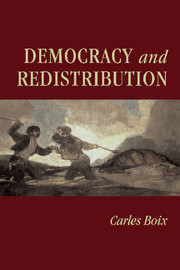Book contents
- Frontmatter
- Contents
- List of Figures
- List of Tables
- Acknowledgments
- INTRODUCTION
- 1 A THEORY OF POLITICAL TRANSITIONS
- 2 EMPIRICAL EVIDENCE
- 3 HISTORICAL EVIDENCE
- 4 THEORETICAL EXTENSIONS: GROWTH, TRADE, POLITICAL INSTITUTIONS
- 5 DEMOCRACY AND THE PUBLIC SECTOR
- 6 THE STATE, THE THREAT OF EXPROPRIATION AND THE POSSIBILITY OF DEVELOPMENT
- 7 CONCLUSIONS
- References
- Index
- Title in the series
6 - THE STATE, THE THREAT OF EXPROPRIATION AND THE POSSIBILITY OF DEVELOPMENT
Published online by Cambridge University Press: 05 February 2015
- Frontmatter
- Contents
- List of Figures
- List of Tables
- Acknowledgments
- INTRODUCTION
- 1 A THEORY OF POLITICAL TRANSITIONS
- 2 EMPIRICAL EVIDENCE
- 3 HISTORICAL EVIDENCE
- 4 THEORETICAL EXTENSIONS: GROWTH, TRADE, POLITICAL INSTITUTIONS
- 5 DEMOCRACY AND THE PUBLIC SECTOR
- 6 THE STATE, THE THREAT OF EXPROPRIATION AND THE POSSIBILITY OF DEVELOPMENT
- 7 CONCLUSIONS
- References
- Index
- Title in the series
Summary
The previous chapters of the book described the choice of political regimes as mainly the result of the underlying economic conditions and political resources of social classes and sectors in each country. In other words, the democratic or authoritarian character of the state reflected the existing balance of power between different political agents and sectors – a balance that was shaped, in turn, by the distribution and nature of assets and political resources among societal agents. Politics was understood as the emergence and management of conflict in society.
In that model, politicians played a rather subdued role from a theoretical point of view. They were seen as simply reflecting the interests of social groups and, at most, of tacitly solving the coordination problems that beset any group engaged in collective action. But their preferences (and corresponding strategies) did not deviate from the preferences of their electors (and from the strategies that any other elector in office would have pursued). In short, political elites, either in government or in opposition, lacked autonomy vis-à-vis citizens.
Although that simplified conception of the relationship between politicians and citizens gave us substantial theoretical and empirical leverage, the linkage between politicians and their constituencies is generally imperfect. Politicians are unlikely to behave as pure agents in pursuit of the interests of their principal (the broad public in a democracy or the enfranchised class in an authoritarian regime).
- Type
- Chapter
- Information
- Democracy and Redistribution , pp. 204 - 232Publisher: Cambridge University PressPrint publication year: 2003

